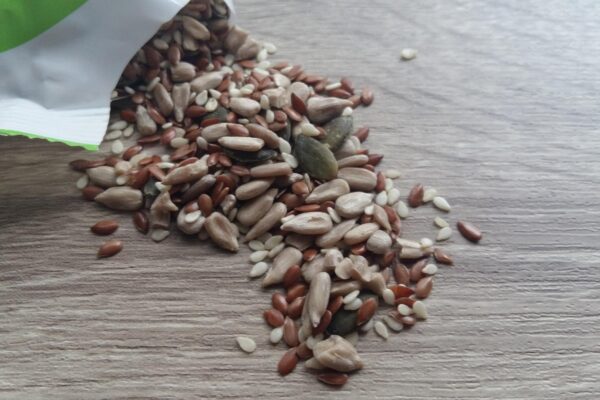Achieve Your Goal: The Ultimate Guide for Losing 15 Pounds in Just One Month

Do you know, people becoming more aware of how to lose an excess number of pounds safely and fast? But sometimes, they can’t sustain weight loss.
Do you want to know, how can you lose at least 15 pounds in a month and how to sustain that? So, keep reading on.
Losing 15 pounds in a month is a significant amount of weight loss, and it’s important to approach it safely and sustainably.
In general, a safe rate of weight loss is considered to be 1-2 pounds per week or 4-8 pounds per month, depending on various factors such as age, gender, body composition, and activity level.
Losing 15 pounds in a month is a challenging goal, and it’s crucial to approach it safely and sustainably.
Rapid weight loss can have adverse effects on your health, and it’s essential to prioritize your well-being over short-term results. (1)
Here are some of the best ways to lose weight safely and effectively in a month:
Follow a Balanced Diet
Weight loss is all about creating a calorie deficit, which means you need to consume fewer calories than you burn.
A balanced diet that includes plenty of fruits, vegetables, lean protein, and whole grains can help you achieve this goal while keeping you full and satisfied.
Calorie Control: A balanced diet can help you control your calorie intake by ensuring that you consume enough nutrients while limiting excess calories.
Nutrient-Dense Foods: A balanced diet provides essential nutrients such as vitamins, minerals, and fiber that your body needs to function correctly.
It can help you feel more energized and improve your digestion.

Improved Metabolism: Eating a balanced diet that includes a variety of nutrient-dense foods can help keep your metabolism working efficiently, which can help you burn more calories and lose weight.
Keep a Food Journal on Calories Consumption
Writing down everything you eat can help you become more aware of your food choices and portions.
It can also help you identify areas where you can make healthier choices and cut back on calories.
This can help you identify areas where you may be overeating or consuming too many calories, allowing you to make healthier choices.
For example, you may notice that you tend to snack more when you’re stressed or that you make poor food choices when you’re tired.
Once you’ve identified these triggers, you can take steps to address them and avoid making unhealthy choices.
Keeping a journal can provide a sense of accountability for your weight loss efforts. Knowing that you’re tracking your progress can help you stay motivated and committed to your goals.
By tracking your progress over time, you can see how far you’ve come and set new goals to continue making progress.
Drink Plenty of Water
Drinking plenty of water can be an effective strategy for achieving your weight loss goal of losing 15 pounds in a month.
Drinking water before meals can help reduce your calorie intake by filling you up and reducing your hunger.
This can lead to eating smaller portions and fewer calories, which can help you lose weight. It can help boost your metabolism, which is the process by which your body burns calories.
Drinking water can increase the number of calories you burn at rest, which can help you lose weight. (2)
Drinking plenty of water can help reduce water retention in the body, which can cause bloating and make you look and feel heavier than you are.
By staying hydrated, you can reduce water retention and help your body eliminate excess fluids, which can lead to weight loss.
It can help you replace high-calorie beverages such as sugary sodas or fruit juices, which can contribute to weight gain. By choosing water instead, you can reduce your calorie intake and promote weight loss.
Get Enough Sleep
Sleep is essential for weight loss, as it can affect your appetite, metabolism, and energy levels.
Aim for 7-8 hours of sleep per night to support your weight loss goals.
Getting enough sleep can help regulate hormones that control appetite, such as ghrelin and leptin.
Ghrelin stimulates appetite, while leptin suppresses appetite.
Sleep deprivation can disrupt the balance of these hormones, leading to an increased appetite and overeating, which can lead to weight gain.
Getting enough sleep can help you feel more energized and motivated to engage in physical activity, which can help you burn calories and lose weight.
Lack of sleep can increase stress levels, which can lead to overeating or consuming unhealthy foods.
By getting enough sleep, you can reduce stress levels and avoid turning to food as a way to cope with stress.
It can affect your metabolism, which is the process by which your body converts food into energy.
Poor metabolism can lead to weight gain and difficulty losing weight. Lack of sleep can increase the likelihood of late-night snacking, which can directly contribute to weight gain.
Avoid Processed Foods
Processed foods are foods that have been altered from their natural state through methods such as canning, freezing, or adding preservatives, sweeteners, or other additives.
Examples of processed foods include fast food, packaged snacks, sugary drinks, and frozen meals.

Processed foods are often high in calories and unhealthy fats, which can make weight loss challenging. Stick to whole, nutrient-dense foods as much as possible.
Avoiding processed foods can encourage healthier eating habits by promoting the consumption of whole, nutrient-dense foods such as fruits, vegetables, whole grains, lean protein, and healthy fats.
These foods can help you feel fuller for longer, provide essential nutrients, and support your weight loss goals.
Processed foods are often high in refined carbohydrates, which can cause inflammation in the body. Chronic inflammation can contribute to weight gain and other health problems.
By avoiding processed foods, you can reduce inflammation and promote overall health.
Consider Intermittent Fasting
Intermittent fasting is a consumption technique that contains rotation among periods of eating and fasting.
It can help you reduce your calorie intake and may have other health benefits as well.
Time-Restricted Feeding: This involves limiting your daily eating window to a certain number of hours, typically between 8 and 10 hours, and fasting for the remaining hours of the day.
Alternate-Day Fasting: This includes eating generally one day and fasting or eating very few calories the next day.
5:2 Diet: This encompasses consuming generally for five days of the week and limiting calorie ingestion to 500-600 calories for the lasting 2days.
Intermittent Fasting Can Help Lose 15 Pounds in a Month
Intermittent fasting can help reduce calorie intake by limiting the time window during which you can eat.
This can lead to a reduction in overall calorie intake and promote weight loss. Intermittent fasting can help boost metabolism by increasing levels of human growth hormone (HGH) and norepinephrine, which can help burn fat and maintain muscle mass.
During fasting periods, the body switches from burning glucose for energy to burning stored fat.
This can promote fat loss and contribute to weight loss. It will reduce inflammation in the body, which can contribute to weight gain and other health problems.
Intermittent fasting can improve insulin sensitivity, which can help regulate blood sugar levels and prevent insulin resistance, a condition that can lead to weight gain.
Manage Stress
Stress can affect your appetite and make it challenging to lose weight. Find ways to manage stress, such as meditation, yoga, or deep breathing exercises.
Stress management can be an important factor in achieving your weight loss goal of losing 15 pounds in a month.
Stress can trigger emotional eating, which can lead to overeating and weight gain.
By managing stress, you can reduce the likelihood of turning to food for comfort and reduce overall calorie intake.

It interferes with sleep, which can disrupt hormones that regulate appetite and metabolism.
Poor sleep can also lead to fatigue, which can make it harder to stick to a healthy eating plan and exercise routine. By managing stress, you can improve sleep quality and support weight loss.
Cortisol is a hormone that is released in response to stress. High cortisol levels can lead to weight gain, particularly in the abdominal area.
By managing stress, you can reduce cortisol levels and promote weight loss. (3)
Summary
Losing 15 pounds in a month may be possible for some people, but it’s not a realistic goal for everyone, and it may not be safe or sustainable for everyone.
Rapid weight loss can have adverse effects on your health, such as muscle loss, nutrient deficiencies, gallstones, and dehydration.
It can also lead to rebound weight gain and make it harder to maintain weight loss in the long term.
While it may be possible to lose 15 pounds in a month for some people, it’s important to prioritize your health and well-being and to approach weight loss safely and sustainably.
A balanced diet, regular exercise, and lifestyle changes can help you achieve your weight loss goals healthily and sustainably.



